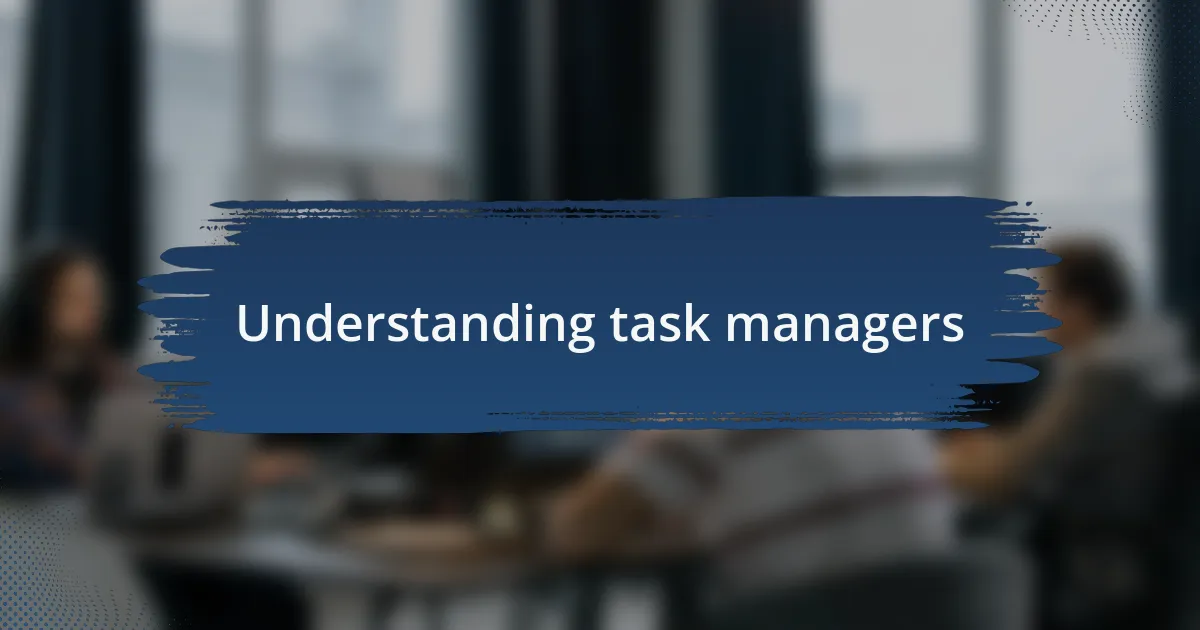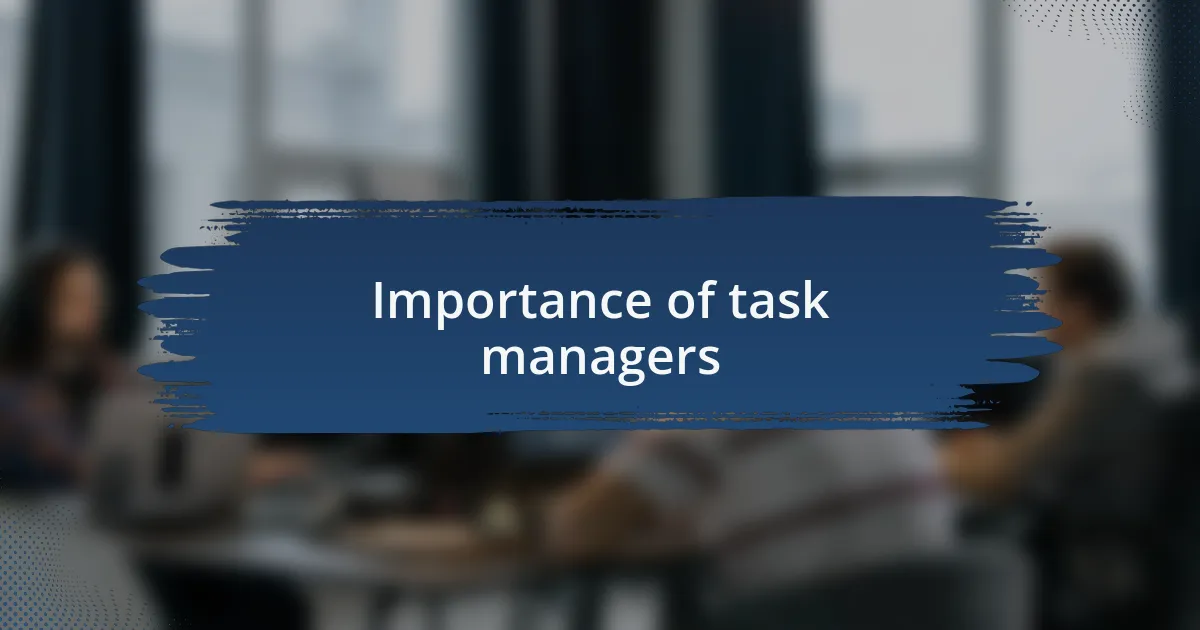Key takeaways:
- Task managers are crucial for monitoring system performance and troubleshooting issues, enhancing overall productivity.
- User-friendly interfaces and robust diagnostic features are essential for effective task management and quick problem resolution.
- Customizable views and integration with other tools enhance workflow efficiency and user experience.
- Collaboration features and real-time updates are vital for teamwork, improving communication and project tracking.

Understanding task managers
Task managers are essential tools in any operating system, serving as the command center for monitoring and controlling active processes. I still remember the early days of using Windows when I stumbled upon the Task Manager for the first time – it was like discovering a hidden treasure. I was amazed at how I could end unresponsive applications with a simple click, saving my work and sanity in those frantic moments.
Understanding how task managers operate goes beyond just their functionalities. They allow us to glimpse the inner workings of our computers, laying bare which applications are hogging resources or misbehaving. Isn’t it fascinating to think about how a simple task manager can provide insights that empower us to optimize our workflows?
As someone who frequently juggles multiple tasks, I’ve found that a well-structured task manager can significantly enhance my productivity. When I realize I’m nearing the limits of my system’s resources, I often pause to reflect: What am I willing to sacrifice for efficiency? This kind of awareness transforms how I approach my tasks, pushing me to make smarter choices on my computer.

Importance of task managers
Task managers are vital for ensuring that our systems run smoothly. I’ll never forget a time when I was deep into a project, and my computer started lagging. A quick peek into the Task Manager revealed a rogue application consuming more resources than I anticipated. It’s moments like these that remind me how crucial it is to identify and resolve bottlenecks swiftly to maintain peak performance.
Another important aspect of task managers is their role in troubleshooting. The first time I encountered a system crash, I felt a wave of panic. Yet, returning to the Task Manager helped me analyze what processes were running at the time. This experience taught me that understanding memory usage and CPU load can transform a frustrating situation into a learning opportunity. Have you ever found yourself in a similar predicament, realizing that a simple check could have saved you hours?
Moreover, task managers foster a sense of control over our digital environments. I once spent an entire day working on a large dataset, only to find my system unresponsive. In that moment, using the Task Manager not only saved my progress; it also empowered me by showcasing my ability to take charge of my computer. Isn’t it comforting to know we possess the tools to troubleshoot and optimize our own technology?

Key features to consider
When selecting a task manager, the user interface is paramount. I vividly remember the first time I used a convoluted interface—it felt like searching for a needle in a haystack. A clear, intuitive design allows me to quickly find essential functions, which is invaluable, especially when I’m racing against a tight deadline. Have you ever wasted precious minutes trying to decipher a confusing layout?
Next, robust diagnostic features are crucial. I recall a day when my system was uncharacteristically slow, and diving into the performance metrics revealed that an update I’d overlooked was causing the drag. Having detailed insights into CPU and memory usage not only helped me resolve the immediate issue but also guided me in future preventive measures. Isn’t it reassuring to have those tools at your fingertips, providing clarity when chaos seems to reign?
Lastly, the capability for process management can’t be overlooked. There was a time when I had multiple applications open, and one of them was clearly hogging resources without any reason. The ability to prioritize tasks and terminate unresponsive applications in real-time made all the difference. It’s like having a digital assistant ensuring that everything runs as smoothly as possible. How often do we encounter situations where a quick adjustment can save us from unnecessary frustration?

Evaluating task manager options
Evaluating task manager options involves a careful consideration of what truly works for you. I’ve found that working with different managers revealed how essential customizable views are for my daily workflow. The first time I experienced a task manager that allowed me to streamline my workspace according to my specific needs, I felt an incredible sense of relief. It made me wonder: how much more productive could we all be if our tools adapted to us instead of the other way around?
Another critical factor is the level of integration with other system tools. I remember trying a task manager that seamlessly connected with my file explorer and even my email notifications. This integration changed how I approached multitasking—it felt as if everything was working together rather than in isolation. Have you ever had that moment when everything just clicks? It’s empowering to feel that synergy in your work environment.
Performance impact is yet another essential consideration. I once tested a feature-rich task manager, but it dramatically slowed down my computer—an ironic twist for a tool designed to improve efficiency. It served as a sobering reminder that the best choice balances functionality with system performance. Have you had a similar experience where a tool promised much but delivered little? That’s why I always prioritize picking a task manager that enhances—not hinders—my experience.

My personal requirements
When considering a task manager, one of my personal requirements is the ability to set reminders and due dates. I recall a time when I juggled multiple projects for work and never missed a deadline, all because my task manager sent me timely prompts. It was a game changer, emphasizing the importance of not just tracking tasks but also actively managing my schedule. Have you ever realized how a simple reminder can keep you on track?
Another aspect I prioritize is user-friendly design. I remember downloading a task manager that looked great but was so complex it left me frustrated. It made me appreciate how crucial an intuitive interface is for actually getting things done. A task manager should feel like a helpful companion rather than an obstacle. Can you relate to that feeling of wanting a tool that works with you instead of against you?
Lastly, collaboration features are essential for my personal workflow. I’ve often found myself working in teams where sharing tasks and updates is vital. A memorable project involved a tight deadline, and using a task manager that allowed real-time collaboration made all the difference. It enhanced communication and kept everyone on the same page. Isn’t it remarkable how teamwork can flourish with the right tools supporting it?

Final selection process
When it came to the final selection process, I took time to weigh each task manager against my requirements. I created a simple comparison chart, listing features like reminders, design, and collaboration options. One day, while reviewing the chart, the intensity of deciding which tool would shape my productivity hit me; it felt like choosing a compass for a journey.
After narrowing it down to two contenders, I decided to test them in real-life scenarios. I remember the excitement of setting up my tasks in each app; it felt like trying on new shoes. Ultimately, one stood out not just in functionality but in how it made me feel: less stressed and more organized. Have you ever felt that rush of clarity when you find the right fit for your needs?
Finally, I consulted feedback from friends and colleagues who used the same task managers. I vividly recall a conversation with a coworker who passionately advocated for one option; his enthusiasm was infectious. His insights confirmed my instincts and helped me realize that community feedback can play a pivotal role in this process. How often do our peers influence our choices in tools we rely on daily?